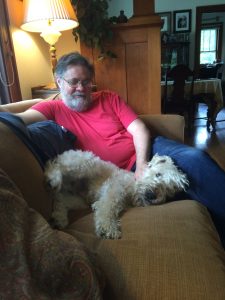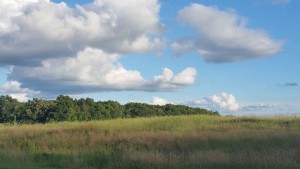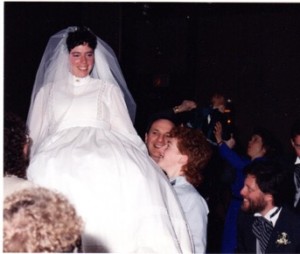Last Sunday I was at a conference for Jewish educators, NewCAJE where I attended an intensive workshop on how we educate about Israel. 6 hours about what can be a difficult topic. Much of it was about the process of how to have a difficult conversation. It seemed more appropriate to adult study sessions than after school religious school. Yet I was grateful to study with recognized scholars and activists and in listening to them and my classmates I learned much.
Yehezkel Landau’s guidelines on how to have a difficult conversation are masterful and expect to see them make an appearance either for Tisha B’Av which was never far from my mind during the class or for Selichot where we will be looking as speech. Joyce Schriebman’s gentle, compassionate prodding and her own background in non-profit management made the class practical as well as insightful.
At some point Sunday afternoon I said, “I think that many of these topics are difficult precisely because they are not black and white but shades of grey. Sometimes people are more uncomfortable with grey. People in my congregation have a hard time with ambiguity.”
Although I often argue that Judaism is a layered tradition, with many answers to each question, I didn’t realize I was going to be called upon to live out that essential truth just so quickly.
On Thursday, the Elgin community got word that our police chief, Jeff Swoboda, has signed onto a proposal for SmartGun technology. He joins 102 other city leaders across the country to do so. A project sponsored by IAF and Don’t Stand Idly By, it is a bi-partisan proposal to make guns safer. It does not limit access to guns or impinge on people’s second amendment rights. It is a proposal I have supported for more than a year since I first learned about it from the Chicago Board of Rabbis. I was pleased to be able to sit in on meetings with the chief and the mayor. The announcement made me actually cry. It seemed like a piece of the puzzle and something I have been working towards for more than two decades. That’s consistency.
Let me explain why. My first finance was killed by a terrorist bomb in Lebanon in 1983. There could be two responses to that. And believe me, I tried both. I could become militant and seek revenge—my first approach—and try to justify the “incursion” into Lebanon. Or I could become a peacenik. I could blame Sharon for Yuval’s death—which I did for years. I could become bitter, angry, withdrawn. Or I could find another way.
I decided I had to find another way. And for years I have worked for peace in the Middle East. For peace on the streets at home. That’s consistency.
When I sat in that class last Sunday the first exercise, the very first question in fact, in writing, was on a page entitled Assumptions. “How do I think and feel about Israel? The Israelis? The Israeli government?” And the answer is “It’s complicated.” It is not black and white. And I had that uh-oh feeling. Maybe I shouldn’t be in this class. Maybe it will be too difficult. Too emotionally draining. I chose to stick it out. That’s consistency.
One way for me to cope with Yuval’s death. And I do mean cope. Even 30 years after the fact it still brings me pain. It still makes me wonder “what if.” One way is to work so that no other family, no mother, no sister, no wife, no finance, has to go through the pain I went through. That has meant trying to engage in meaningful ways with Palestinians and Lebanese. That means reading everything I could on the topic. That means, as a victim of gun violence, working on gun safety. That means writing a thesis on the 13 Attributes of the Divine and looking at the Israeli-Palestinian question. That means when doing Israel education in Hebrew Schools including both the David Project and J-Street, even at the risk of my own job.
Let me be really clear. I am pro-Israel. Israel is my spiritual home—even though I have had such mixed experiences with the State of Israel. Being told because my name is Margaret that I was not Jewish (there is more to that story—but even last Sunday someone raised that question). Being a victim of a violent crime that involved guns. Losing Yuval. These are not positive experiences. I could have walked away. I could not.
Instead, I have learned that I can hold more than one truth at a time. I can be proud of Israel and critical of some of its policies. I can say that Black Lives Matter and Police Lives matter at the same time. In fact, own of my high holiday sermons was titled “All Lives Matter,” and at the time I thought I was original. All lives matter. Black lives and police lives. Israeli lives and Palestinian lives.
No one should pick up a knife and stab a 13 year old girl to death in her bed. Period. No child playing on her porch should be shot. Period. And the police need to look again at its training and procedures in the wake of yet another shooting. Period. These are not mutually exclusive thoughts. It is not black and white.
This week, just as we were getting the word that Chief Swoboda had signed on, we also received the news that the Black Lives Matter movement had adopted a platform that includes a plank linking Israel with genocide and apartheid. We have seen this language before. From the UN. From the BDS movement. And while I have issues with some of Israeli policies, this is wrong. Period. This is anti-semetic. And it hurts. It feels like a personal betrayal.
However, ultimately I believe it is an educational moment—even for me. It won’t be easy. I reached out to both a black Baptist minister and a black school board member. They were not aware of the plank and were aghast. 60 organizations who are part of the Black Lives Matter movement, a coalition, did not want to comment on it on Friday, according to the Washington Post. Meanwhile Jewish organizations with whom I have deep connections, were distancing themselves quickly and painfully.
Coalition building is difficult. It is messy. It takes work over lots of time. It takes being able to live with ambiguity. With shades of grey. And for me that is authentic.
So this afternoon, I will be a Unity March. It fits with every thing I have worked on since Yuval’s death. I will be there with my Congregation Kneseth Israel t-shirt. This rally was planned by some of our young, emerging, black leaders. Together with the Elgin Police Department , the Elgin Human Relations Commission, Elgin City of Peace and the Coalition of Elgin Religious Leaders. I have been working with each of those groups for four years.
This event is not about Israel. It is about co-existence. It is about unity. It is about peace. It is about emerging leaders responding to a tragedy, authentically, from within their own experience, their own pain, their own grief.
Where else would I be on a Sunday afternoon? That is consistent and authentic to who I am.
Update: Kudos to Michael Cole and Christopher Cole for running a smooth event.To Mae and Brittany. To Danise and Danielle. To Chief Swoboda and Bill Wolf and Al Young. And to many others behind the scenes. It was powerful. It was meaningful. And it brought together the best of Elgin. At the last minute I was called on to pray. I think I said something like, “Gracious G-d, we come before you black, white, Latino, LGBTQ, Native American and who knows what else. And that is precisely the point. We represent the diversity that is Elgin. What makes Elgin and this nation great. Help us to eradicate the fear that has gripped our nation. Help us to model a better way. Be with us as we march. Together. In unity. Guide our steps. In peace. Keep us safe. Our young black men and our police officers. All of us. In love. All of us want nothing more than to return to our families at the end of our day, safe. In your glorious Name. Amen.
And then we walked. From Festival Park to the Police Station. From the Police Station to Dupage Court. There were no incidents. One gentleman yelled at us that Blue Lives Matter and someone further up in the line pointed out that there were police officers—actually high brass—the Deputy Chief and one of the three Commanders, marching with us.
This march took on even more urgency. Traci Ellis, our school board member, is a cousin of Paul O’Neal, the young man shot and killed by Chicago Police last week. As a rabbi, as a chaplain, as someone who has worked on the front lines, even going to Ferguson last year with T’ruah, words fail. As Traci’s friend, words fail. I walked. For long stretches with Traci.
There were lots of moments for that “educational moment.” This was not a Black Lives Matter event, although some had signs or a T-shirt proclaiming that black lives do matter. Not one of my African-American friends believes that Israel commits genocide. Not one of them had even seen the plank. Some leaders, black and white, expressed concerns about human rights violations in Israel. I am too. So this is a process. It will be messy. It will be difficult. But it is important.
It was a good day for Elgin. I am proud that I was there. It was consistent with my core values and authentically me


 If, when I open the refrigerator, I see three different things I would really like to eat, I am happy to have so many possibilities.
If, when I open the refrigerator, I see three different things I would really like to eat, I am happy to have so many possibilities.
